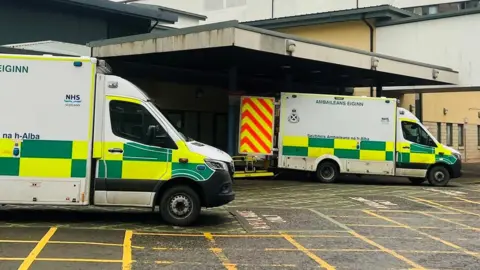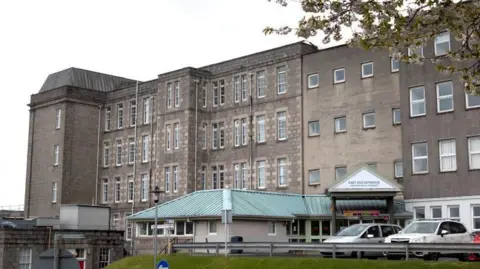NHS Grampian was warned of 'intolerable risk'
 BBC
BBCSenior NHS Grampian clinicians formally raised concerns with management about an “intolerable” level of risk three months before a critical incident was declared, BBC Scotland News can reveal.
NHS Grampian declared the critical incident last week that saw some ambulance patients diverted to hospitals outside its area due to demand at Aberdeen Royal Infirmary (ARI). It was later stood down.
A letter from members of the Medicine and Unscheduled Care (MUSC) leadership team back in August warned that not enough was being done to meet the expected increase in demand over winter.
NHS Grampian said the points in the letter had been considered and "enormous challenges" were being faced by its teams.
The health board said it had to take the "significant step" last Thursday after sustained and continuing demands at ARI.
Patients were diverted to Dundee and Elgin where "clinically appropriate", although life-saving care was still delivered at ARI.
After it was stood down, health chiefs said the hospital had entered a "recovery phase" and there would be a review of the incident.
The August letter to senior management said: "Over the past 12 months multiple risks have been reported and recorded from all areas of the portfolio, both formally and informally.
"Despite this, we are experiencing a deterioration in the performance against most measures and targets and the quality of care we are able to deliver to patients.
"We are increasingly concerned about the impact this sustained pressure and risk is having on our staff. We see regular evidence of individuals and teams who are experiencing harm from the required workload and inability to deliver effective care for patients with the resources available."
It added: "We are aware that these concerns have been escalated previously and despite reassurances, this has not resulted in any significant improvement."
The critical issues raised included staff wellbeing and longer term improvement.
"The current trajectory of performance and occupancy across MUSC in recent months suggests continuous deterioration," the letter said.
"There is no evidence to support any planned improvement work or capacity changes that will meet the impending increase in demand seen over October and sustained over [the] winter period.
The letter said the authors were aware of the financial pressure across NHS Grampian and the extent of the projected overspend.
 PA Media
PA MediaNHS Grampian interim chief executive Adam Coldwells told BBC Scotland News he and another senior manager had considered the points raised in the August letter and they had both written to and met the authors.
"Continuous discussion with, and hearing the challenges of all our colleagues, is an integral part of both understanding the issues and finding the right solution," he said.
"There are enormous challenges facing our teams, not only in medicine and unscheduled care, but in other parts of acute care, in community hospitals, and working out in the community itself. The past week has shown those challenges play out in real time."
Mr Coldwells said there was no "single solution" to these problems and added NHS Grampian has the lowest number of hospital beds per head of population in Scotland.
He added: "We continue to look at ways to improve flow within the footprint across the whole of health and social care in Grampian. In addition, our colleagues in Scottish government have committed to support that work as necessary.
"The hard work and dedication of our teams cannot be understated in such difficult times."
Government discussions
Speaking on Monday, First Minister John Swinney said ministers were in discussions with NHS Grampian about the incident.
"The government will continue to work with NHS Grampian, listening at all times to the clinical workforce, to make sure that we design services, that we put the resources in, and that we take the correct approach to make sure that we have sustainable health services that meet the needs of people in all parts of the country," he said.
NHS Grampian said in the last week average occupancy at ARI was 111%. The hospital has not been under 100% occupancy since September. At Dr Gray’s in Elgin, it has been at 124% and has also not been under 100% since September.
The critical incident led to some elective procedures and appointments being postponed, but not for cancer treatment and diagnostic tests.
BMA Scotland said it was "extremely concerned" by the timing of incident, ahead of the busy winter season.
